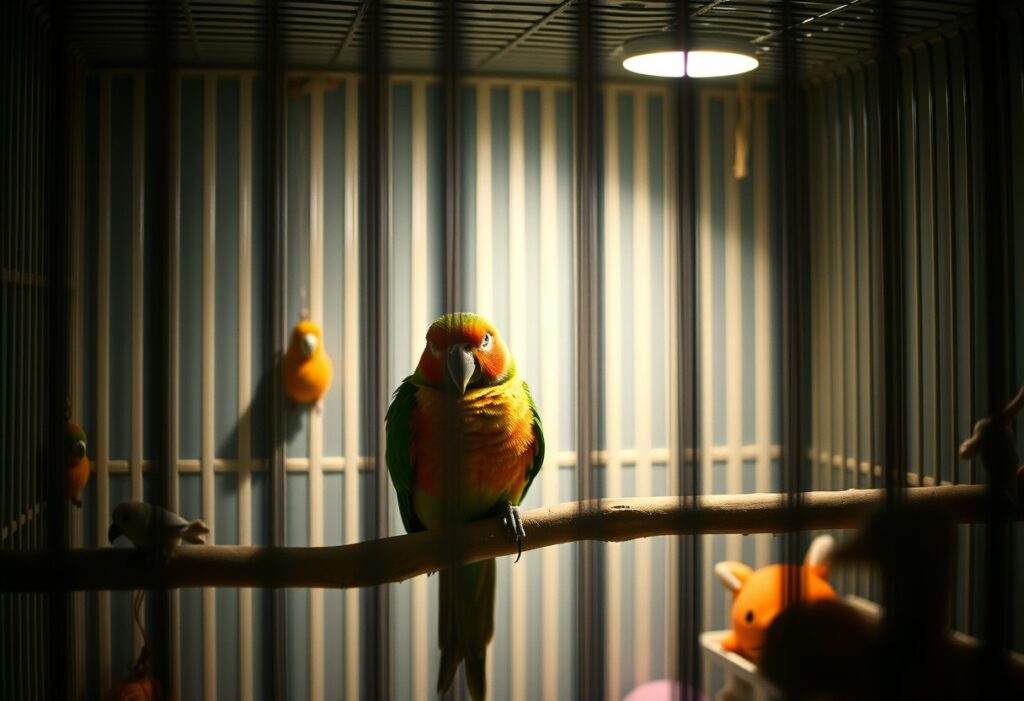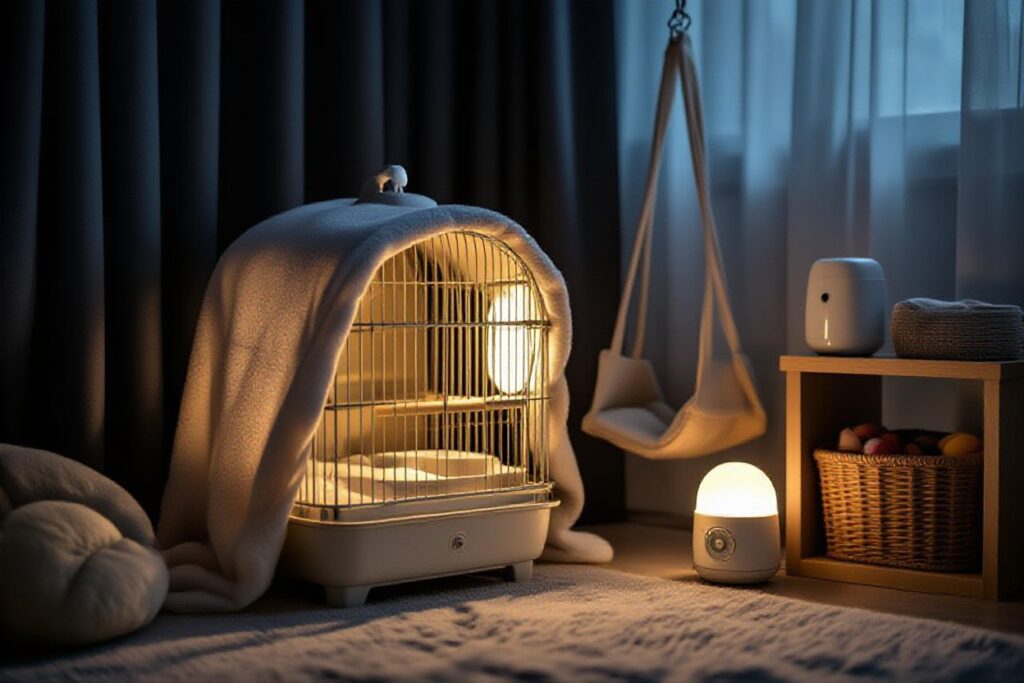Patterns of sleep are crucial for your bird’s overall health and well-being. Understanding these sleep needs can help you create an environment that promotes restful sleep, enabling your bird to thrive. It’s important to recognize that inadequate sleep can lead to stress, behavioral issues, and health problems. By ensuring your feathered friend has the right sleeping conditions, such as reduced light at night and a quiet space, you can foster a happier and healthier pet. This guide will help you navigate the intricacies of your bird’s sleep patterns and needs.
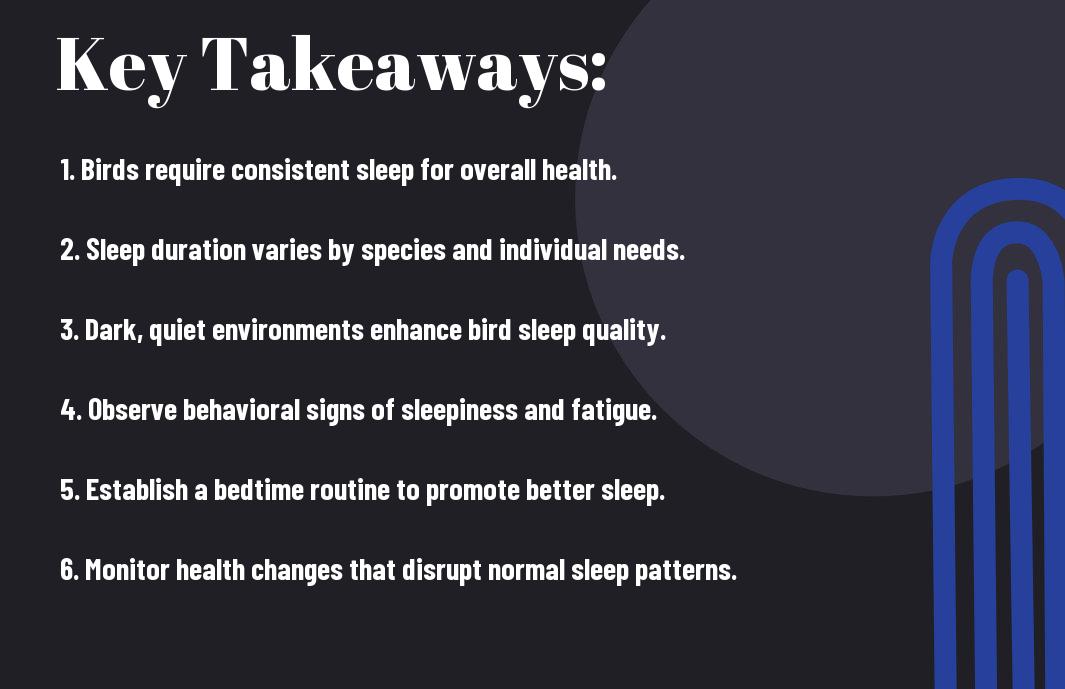
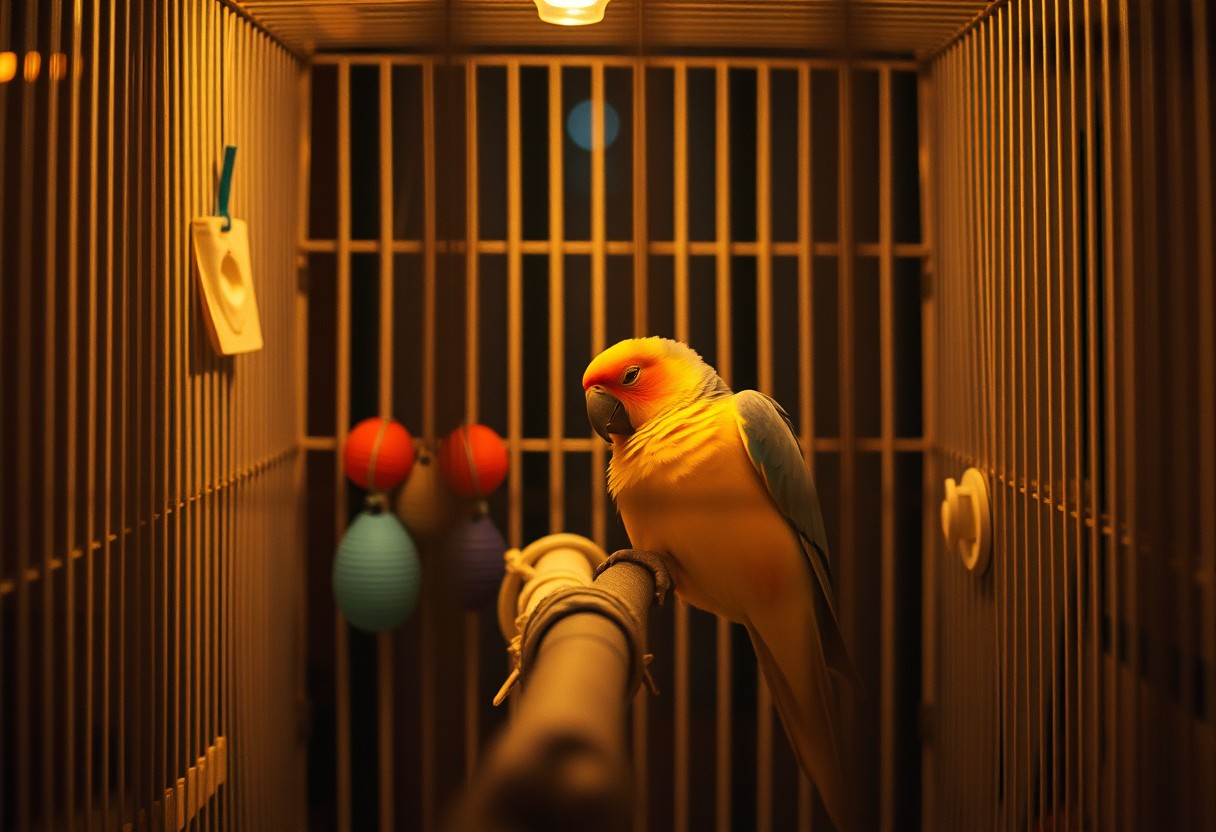
The Importance of Sleep for Birds
While you may think that sleep is simply a time for your bird to rest, it is actually a crucial part of their overall health and well-being. Just like humans, birds require adequate sleep to function optimally. Sleep helps them recover physically, maintain cognitive functions, and regulate their mood. Lack of sleep can lead to a plethora of issues such as decreased immunity, impaired learning abilities, and even behavioral problems. Understanding the importance of sleep can help you provide better care for your feathered friend.
Physiological Benefits
Any bird owner should understand the physiological benefits of sleep for their pets. It plays a vital role in processes such as growth, healing, and general health maintenance. Sleep allows your bird’s body to repair tissue, produce necessary hormones, and strengthen their immune system. A well-rested bird will exhibit more vigor and overall health, while fatigue from poor sleep can make them more susceptible to diseases and infections.
Additionally, sleep is crucial for your bird’s metabolic processes. During sleep, especially during the REM (Rapid Eye Movement) stage, your bird’s body conserves energy, allowing them to utilize it more efficiently while they are awake. This is crucial for maintaining normal bodily functions and supporting their unique energy needs, especially for species that rely heavily on high metabolic rates.
Behavioral Aspects
An understanding of your bird’s sleep patterns also extends into their behavioral aspects. Birds are naturally wired to sleep at specific times, usually at night and during certain periods of the day. Disruptions to their natural sleep cycles can lead to stress, anxiety, and aggression. You may notice that your bird becomes irritable or even nippy when they haven’t had enough rest, which is a clear sign that they need more sleep.
Behavioral changes related to insufficient sleep can manifest in various ways, including increased vocalization, attention-seeking tendencies, and destructive behaviors. Moreover, a lack of sleep can also impair your bird’s ability to interact positively with you and others, potentially leading to a breakdown in bonding and trust. Consequently, ensuring a peaceful sleep environment is paramount to your bird’s emotional and psychological health.
Sleep Patterns of Different Bird Species
Now, understanding the unique sleep patterns of various bird species is important for providing them with the best care possible. Your bird’s sleep needs will significantly depend on whether they are nocturnal or diurnal, as each group has adapted its daily rhythms to optimize for their specific environmental conditions and behaviors.
Nocturnal vs. Diurnal Birds
Birds can be classified as either nocturnal, meaning they are active at night, or diurnal, which refers to those that are active during the day. Nocturnal birds, such as owls and nighthawks, have specialized adaptations that allow them to see and navigate in low light. This means they require consistent darkness during their rest periods to sleep undisturbed. On the other hand, diurnal birds, like robins and sparrows, thrive in daylight, relying on their vision to forage and socialize. They require adequate exposure to natural light and prefer to sleep at night when it is dark.
Birds, regardless of their activity pattern, require a structured sleep schedule that respects their natural circadian rhythms. Understanding whether your pet bird belongs to the nocturnal or diurnal category will help you create an appropriate environment for your feathered friend. If you maintain a consistent sleep-wake cycle for your bird, you can ensure they are well-rested, energetic, and overall healthier.
Impact of Habitat on Sleep Cycles
Sleep is deeply influenced by the habitat in which a bird lives. In natural settings, birds adapt their sleep patterns based on environmental cues such as light, temperature, and predation risks. For instance, a parrot in the rainforest will adjust its sleep cycles to the changing light conditions caused by the thick canopy overhead, while a bird in an open field may respond more directly to the sun’s position. This shows that understanding your bird’s habitat can greatly inform you about its natural sleep needs and patterns.
Plus, any disturbances in your bird’s surroundings can affect its sleep quality. In environments with frequent noise or movement, birds may feel less secure and can even experience disrupted sleep leading to stress and health issues. It’s crucial to provide a quiet, dark, and safe sleeping area for your pet, mimicking their natural habitat as closely as possible for optimal well-being.
Environmental Factors Influencing Bird Sleep
For your bird, sleep is an crucial part of its overall well-being, and understanding the environmental factors that influence this aspect of its life is key to providing a healthy and comfortable habitat. Various elements can deeply affect your bird’s sleep patterns, including light and darkness, noise levels, and temperature. Here are some of the primary factors you should consider:
- Light and Darkness
- Noise and Disturbances
- Temperature and Climate Conditions
Light and Darkness
On a fundamental level, birds are affected by light and darkness much like humans are. The natural cycle of day and night helps regulate their sleep-wake cycles via circadian rhythms. Providing a consistent light schedule will help your bird recognize when it’s time to rest, promoting better sleep quality. Use natural light or adjustable LED lights to accommodate your bird’s needs, ensuring that it has a tranquil environment during the evening.
Additionally, it’s vital to minimize any interruptions in this light cycle. Maintaining an environment that simulates natural conditions will allow your bird to enjoy a well-deserved night’s sleep. If your home is subject to varied light pollution from external sources, consider using blackout curtains during the night to ensure darkness.
Noise and Disturbances
For many birds, noise is a significant factor that can disrupt sleep. Your pet may respond negatively to loud sounds, ranging from household appliances to voices or music. To maintain a calm sleeping environment, consider creating a designated quiet area for your bird, especially during its sleeping hours.
Plus, be aware that consistent disturbances can lead to chronic stress in your bird, resulting in health issues such as feather plucking or decreased immune functionality. Offering your bird a covered sleeping area can help shield it from sudden noise, allowing for uninterrupted rest.
Temperature and Climate Conditions
On the flip side, temperature and climate can also dramatically influence your bird’s comfort during sleep. Ideal sleeping temperatures typically range between 65-85°F (18-29°C), but it’s best to know the specific preferences of your bird species. Your bird’s sleeping environment should be free from drafts while also being adequately ventilated to prevent overheating.
| Temperature Considerations | Impacts on Sleep |
|---|---|
| High temperatures (over 85°F) | Can lead to heat stress, affecting sleep quality. |
| Low temperatures (below 65°F) | Can cause discomfort and potential health issues. |
| Drafts and fluctuating temperatures | Can lead to stress and sleep disturbances. |
Disturbances in your bird’s sleeping environment, such as poor temperature control, can lead not only to disrupted sleep cycles but also to negatively affecting your bird’s health. It’s crucial to regularly monitor the conditions of your bird’s habitat, ensuring that it remains a sanctuary for rest.
| Climate Factor | Effects on Bird Behavior |
|---|---|
| Humidity Levels | Can affect respiratory health and comfort. |
| Extreme Weather Conditions | Can lead to anxiety and stress, impacting sleep patterns. |
Any disruption in your bird’s natural environment can lead to significant changes in behavior including sleep disturbances and stress. Therefore, it’s necessary to create a stable and nurturing habitat that supports your bird’s sleep needs.
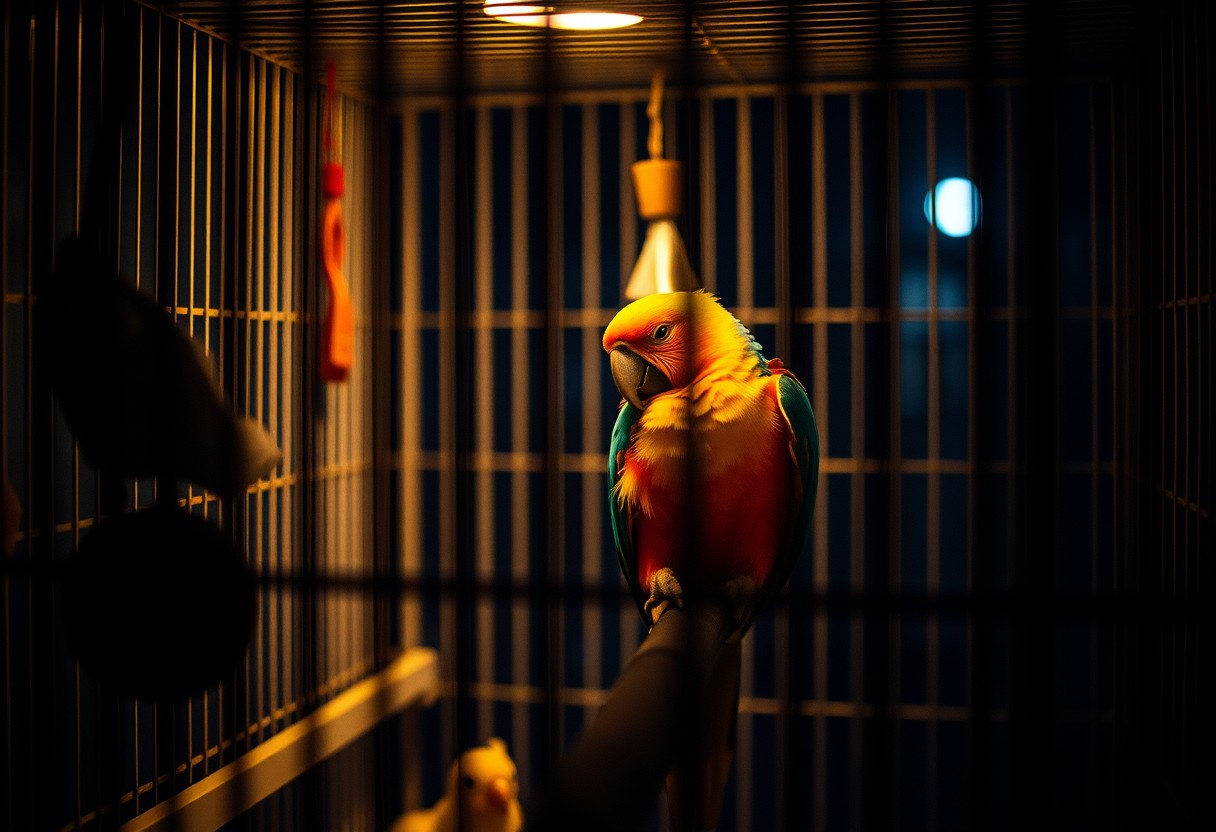
Ways to Support Healthy Sleep in Pet Birds
All pet owners want their feathered companions to thrive, and part of that well-being hinges on proper sleep. Just like humans, birds rely heavily on restful sleep to rejuvenate their bodies and maintain good health. Ensuring your bird has the right conditions for sleep can significantly mitigate stress, prevent behavioral issues, and promote overall happiness. Here are some practical ways to support healthy sleep habits in your pet bird.
Creating a Suitable Sleeping Environment
Sleeping arrangements matter significantly for your bird’s quality of rest. Start by choosing a quiet, dark, and secure location for your bird’s cage during nighttime hours. Birds are sensitive to disturbances, so minimizing external noise and dimming the lights creates a tranquil atmosphere conducive to sleep. You might also consider using a light-weight cover over the cage to provide a sense of security, making it feel like a cozy nook for your pet.
Moreover, ensure that your bird has a spacious and comfortable sleeping area. The cage should be large enough for your bird to stretch out, and the perches should be made of different materials to avoid foot sore. Consider using natural wood branches in varying diameters, as they resemble the natural environment and provide a more comfortable resting place for your bird’s feet.
Establishing a Routine
Sleep is vital for your bird’s well-being, and establishing a consistent sleep routine will greatly improve the quality of their slumber. Birds thrive on predictability, so try to maintain a regular schedule for when lights go on and off in their living space. Aim to mimic natural light cycles by covering the cage in the evening and uncovering it in the morning, as this helps reinforce their biological clock.
By doing so, you help signal to your bird when it’s time to wind down for the night and when it’s appropriate to become active in the morning. This consistency will not only create a sense of predictability but may also help limit any potential stress or anxiety during transition periods.
Observing and Adjusting Sleep Patterns
Sleep patterns can vary significantly among individual birds, and it’s crucial for you to observe your pet carefully. If you notice significant changes in your bird’s sleep habits, such as sleeping more during the day or showing signs of fatigue, it may indicate that adjustments are necessary. Pay attention to changes that could be impacting their rest, such as new noises in the environment or changes in their routine.
Sometimes, your observations may highlight the need to alter aspects of their environment to better suit their sleeping needs. For example, if your bird is waking up too early or too late, you might need to adjust when the lights come on or off. Additionally, consider migrating their cage to a quieter room that could enhance their sleep quality. Be mindful of, your attentiveness will help you create a better atmosphere for your feathered friend.
The more in tune you are with your bird’s unique sleep needs, the more adept you will become at providing a restful environment. By fostering healthy sleep patterns through observation and careful adjustments, you can ensure that your pet bird thrives and remains as happy and healthy as possible.
Summing up
On the whole, understanding your bird’s sleep patterns and needs is crucial for ensuring its well-being and happiness. Just like humans, birds require an adequate amount of rest, which directly impacts their mood, behavior, and overall health. By observing your bird’s sleeping habits and providing an environment conducive to restful sleep, you can help foster a happy and healthy companion. Taking the time to adjust their sleeping conditions—such as implementing a consistent sleep schedule, establishing a dark, quiet area for rest, and recognizing any signs of sleep disturbances—will ensure your feathered friend thrives in your care.
Furthermore, remember that different species may have unique sleep requirements, and being aware of these nuances will enhance your relationship with your bird. By prioritizing their sleep needs and making necessary adjustments, you demonstrate your commitment to their well-being. In turn, your bird will not only feel more secure but also be more active and sociable during the day, enriching your life with its playful and vibrant nature. Equip yourself with this knowledge, and you’ll create a more harmonious environment for both you and your avian companion.
FAQ
Q: Why is understanding my bird’s sleep patterns important?
A: Understanding your bird’s sleep patterns is crucial for maintaining their overall health and well-being. Birds, like humans, need adequate sleep to rejuvenate their bodies and minds. Sleep helps them recover from daily activities, supports their immune system, and reduces stress. Inadequate sleep can lead to behavioral issues, decreased activity levels, and a weakened immune response. By observing and ensuring that your bird has a consistent sleep schedule, you can help them stay healthy and happy.
Q: How much sleep do different species of birds typically need?
A: The amount of sleep required can vary by species. Most pet birds need between 10 to 12 hours of uninterrupted sleep each night. For example, parrots generally thrive with this amount of rest, while smaller birds like budgerigars may require slightly less. It’s important to research the specific needs of your bird species, as some may require additional sleep during certain life stages, such as breeding or molting. Keeping their environment dimly lit during sleeping hours can help promote better sleep habits.
Q: What can I do to create a sleep-friendly environment for my bird?
A: Creating a sleep-friendly environment for your bird involves several key factors. First, ensure that your bird’s cage is placed in a quiet and low-traffic area of your home to minimize disturbances. Dimming the lights in the room or covering the cage with a breathable blanket can signal to your bird that it’s time to sleep. Additionally, establish a consistent bedtime routine to help acclimate your bird to a regular sleep schedule. Avoid loud noises and sudden movements during their sleep hours, and ensure that your bird’s cage is comfortable and safe for them to retreat to at night.
